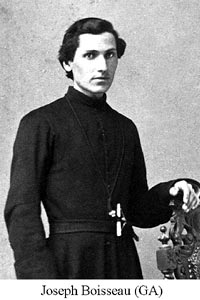Born in Congrier (Mayenne), November 29, 1837
Taking of the habit in N.-D de l’Osier, September 17, 1858
Oblation at Montolivet, May 27, 1860. (No. 508)
Ordination to the priesthood in Marseilles, June 29, 1862.
Died at Colombo, August 7, 1886.
Joseph Marie Louis Boisseau was born at Congrier in the diocese of Laval, France, on November 29, 1837. After his secondary studies at the Institut Saint-Michel de Château-Gontier and one year of theology at the major seminary of Mans, he took the habit at the novitiate of Notre-Dame de l’Osier on September 17, 1858. In September 1859, he began studying at the scholasticate of Montolivet where he made his oblation on May 27, 1860. In his notes on the novices in 1858-1859, Father Vandenberghe wrote that Brother Boisseau “displayed a strong prayer life and a great gentleness of character.” He described him as “an excellent novice” and one with “genuine dedication.” However, for the whole of the novitiate, he noted a defect that he dubbed as being “self-seeking,” “an excessively studied exterior deportment,” “a certain pretentiousness and an affected attitude that is not pleasant,” etc. At Montolivet, Father Mouchette found him to be “very good, generous,” “diligent with enthusiasm in all his duties,” “with a taste for the prayer life and for study,” but “with a self-seeking tendency and a spirit of independence.”
Bishop Cruice ordained him to the priesthood in the cathedral of Marseilles on June 29, 1862. He immediately received his obedience for Ceylon. In the Personnel Register of 1862, we find written after his name: “A physical appearance that is intelligent and agreeable… a good health and an energetic enough temperament… with a generous and active prayer life… Solid virtue, a little above the average in ability, a rather good memory, good judgment, good character, but touchy. He left for Ceylon on September 6, 1862.”
At the beginning of the month of November, he arrived in Jaffna where he stayed one year to learn the Tamil language. He subsequently worked at the mission of Valigamam from 1863 to1867, was director of St. Joseph orphanage at Colombogam from 1867 to 1872, superior and parish priest at Kayts from 1872 to 1874, at Mantotte from 1874 to 1876, at Mannar in 1876-1877. From 1877 to 1883, he was second vicar general of the vicariate of Jaffna. In 1878, Father Boisseau refused the nomination of coadjutor bishop to Bishop Bonjean at Jaffna. He administered the vicariate from March 1879 to October 1880 while the vicar apostolic was in Rome to participate in the General Chapter of 1879.
In July 1883, Bishop Bonjean was appointed vicar apostolic of Colombo and took Father Boisseau with him as his vicar general and superior of the missions of Negombo. He administered the vicariate from 1884 to 1886 during Bishop Bonjean’s stay in Rome where he had been summoned by the Congregation of the Propaganda to offer his opinion on Portuguese protectorate and on the project of establishing the hierarchy in India. Bishop Bonjean was on the verge of asking that he be appointed as his coadjutor when Father Boisseau died in Colombo after a two-day illness (heart attack) on August 7, 1886.
Every place he went, Father Boisseau built rectories, enlarged and embellished churches, especially the cathedral in Colombo. He preached parish missions, exercised his ministry with dedication and was loved by the faithful. In an August 11, 1886 letter to Father Soullier, Bishop Bonjean wrote: “How can I tell you of the misfortune we have suffered? Worthy, beloved Father Boisseau, my right arm, my support and my stay, my faithful and dedicated friend, in Colombo, the glory of our holy religion and our Congregation, the one that I hoped to obtain as my coadjutor and to consecrate him before the end of this year, is no longer of this world! In two days, this beloved priest, who appeared to be the sturdiest one of us all, the one who was so full of activity and who set everything going, has been snatched away from us! […] He fell asleep in the Lord like a child on its mother’s breast; the impression he has left behind is that of the death of a saint. We already knew this; we had received so many testimonies of his goodness; we had so often admired in him his regular observance of the rule, his religious obedience, his Oblate charity, his zeal and limitless missionary dedication, his spirit of sacrifice, etc. His death gave us the key to his life and revealed to us the secret of that serene smile to which the great sufferings of these recent years brought no alteration…”
Yvon Beaudoin, o.m.i.

